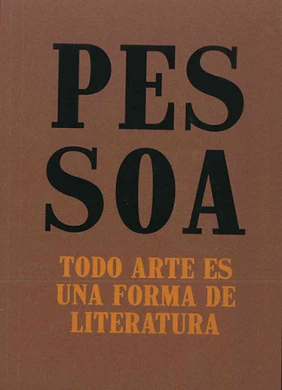-
Wednesday, 7 February Sabatini Building, Auditorium
Different Isms
Pessoa and the Avant-Garde. With the participation of Fernando Cabral Martins and Marta Soares. Moderated by João Fernandes
The process of name-giving involves attaching meaning while restricting other possible meanings, which was the case with the avant-garde movements of the past, their own nomenclature – Cubism, Futurism, Surrealism, Dadaism, etc. – often hindering how they were interpreted. Pessoa’s conception of new words would not only create meeting points between movements, but would also impel an alternative history of modernity to be put forward.
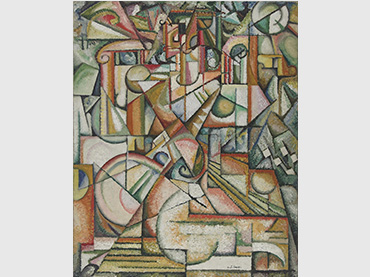
-
Wednesday, 7 March Sabatini Building, Auditorium
Be Plural Like the Universe. Pessoa and Heteronyms
With the participation of António Feijó and Antonio Sáez Delgado. Moderated by Ana Ara
In creating heteronyms, Pessoa foreshadowed, by a number of decades, the contemporary debate on the exact nature of an author. This session explores his heteronym work framed by the existential crisis in the modern subject and the ensuing transformation of fixed and stable identity in a myriad and decentralised process.
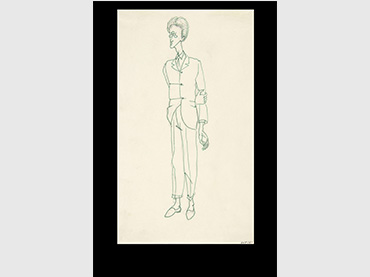
-
4 April Nouvel Building, Auditorium 200
A Book Like the World
Lecture by Tom McCarthy
Within the literature composed as narrative, writing responds to the roles of description and expression. Conversely, Pessoa, and other writers such as Samuel Beckett and James Joyce, dismantled this model to conceive of the book as a space to produce experience, not to represent it, thus understanding it as a medium to question the limits of language. This session, conducted by novelist Tom McCarthy, threads together these ideas with contemporary experiments in writing, projecting Pessoa into the present.
Tom McCarthy is a novelist and essayist. He is the author of several novels, including Remainder (2011), Men in Space (2017), C (2010. Shortlisted for the Man Booker Prize) and Satin Island (2015), which have been translated into more than twenty languages. He is the founder and general secretary of the International Necronautical Society (INS), an invisible network on the artistic and literary construction of death, and his work also explores the possibilities of writing in an age of digital implosion. Moreover, he has worked with different artists and published some of his essays on art in Typewriters, Bombs, Jellyfish (New York Review of Books, 2017).

Pessoa: A Brief History of Modern Art
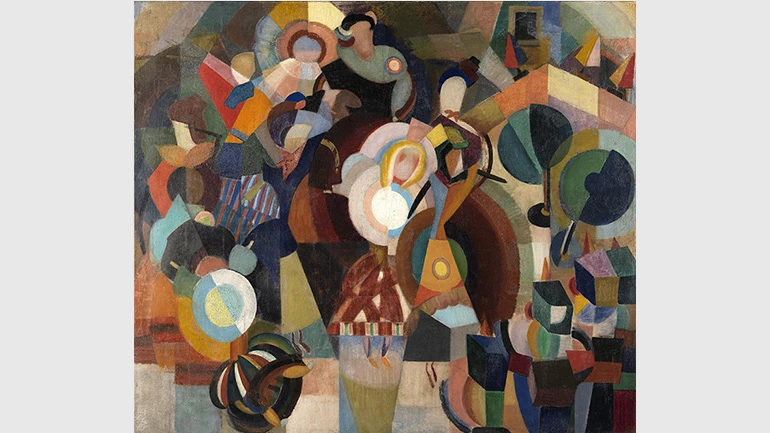
Held on 04 Apr 2018
The programme Pessoa: A Brief History of Modern Art, accompanying and serving as a counterpoint to Pessoa: All Art Is a Form of Literature, an exhibition organised by the Museo Reina Sofía which focuses on the Portuguese avant-garde through a reading of the work of the Portuguese poet, seeks, via different perspectives, to offer an approach to one of the most complex, enigmatic and multifarious narratives in literature. The writings of Fernando Pessoa (Lisbon, 1888–1935) were interwoven with the fragments, folds and voices contained within a disintegrating world, enabling him, in combining the practice of heteronyms, to explore reality as a kaleidoscope of infinite realities. In taking literature as a privileged medium and language, his work, in particular his theoretical output, precipitated a broader corpus encompassing the nub of the Portuguese avant-garde scene in the decades that ushered in the twentieth century. Thus, his proposals and initiatives worked to constitute a re-reading, both lucid and paradoxical, of the underpinnings of modern art.
This programme, conceived as a series of encounters, is split into three sessions to examine the major Pessoan contributions, and their possible interpretations, to the present and to an alternative history of modern art. The first session, entitled Different Isms. Pessoa and the Avant-Garde, centres on the poet’s ambivalence towards the prevailing art movements of the time, of which he was not part, despite actively taking an interest in their experimentations. It also pivots on the series of original “isms” — Paulism, Intersectionism, Sensationism — he coined, taking them and setting out the specifics of the Portuguese avant-garde and other ways of considering avant-garde movements. The second session, Be Plural Like the Universe. Pessoa and Heteronyms, spotlights the practice of heteronyms — which number over one hundred — in the writer’s work, most notably under the guises of Bernardo Soares, author of The Book of Disquiet, the avant-garde Álvaro de Campos or the more classical Ricardo Reis. The heteronym, that unwavering exercise of opening up to the multiplicity and otherness in which disparate aesthetic, philosophical and life-based standpoints coexist, is directly tied to the crisis of the modern subject which began to gestate at the turn of the twentieth century, with identity, the figure of the author and biography radically called into question. The final session, A Book Like the World, touches on the modern idea of art as the creation of a radically new and diverse experience. A language unlike natural language, designating another reality, developing as the same form of naming it takes shape. Moreover, this session surveys the book as an artefact to invent other possible worlds, and concludes the programme in the form of an epilogue, seeking to relate Pessoa’s work with contemporary conceptions of writing.
Organised by
Museo Reina Sofía
In collaboration with
illycaffèParticipants
Ana Ara is co-curator of the exhibition Pessoa: All Art Is a Form of Literature and a research fellow at the Museo Reina Sofía, as well as a project coordinator in the independent space CRUCE. Arte y pensamiento contemporáneo.
Fernando Cabral Martins is a professor of Portuguese Literature at the Universidade Nova de Lisboa. He coordinated Dicionário de Fernando Pessoa e do Modernismo Português in 2008 and has published Introdução ao Estudo de Fernando Pessoa (2014).
António Feijó is a professor of Literary Theory and a lecturer in the Faculty of Arts at the University of Lisbon. He is one of the academic directors of the project Estranhar Pessoa, a comprehensive survey of the Portuguese poet through his heteronyms, and the author of the book Uma admiração pastoril pelo diabo (Pessoa e Pascoaes) (2015).
João Fernandes is deputy director of the Museo Reina Sofía and co-curator of the exhibition Pessoa: All Art Is a Form of Literature.
Antonio Sáez Delgado is a professor of Literature at the University of Évora. Alongside Jerónimo Pizarro, he co-curated the exhibition Fernando Pessoa en España (Biblioteca Nacional, 2014).
Marta Soares is an art historian and a specialist in Portuguese modern art. Alongside Raquel Henriques da Silva, she co-curated the exhibition Amadeo de Souza-Cardoso / Porto Lisboa / 2016 – 1916 (Museu Nacional de Soares dos Reis, Porto, and the National Museum of Contemporary Art – Museu de Chiado, Lisbon, 2016).
Más actividades
![Tracey Rose, The Black Sun Black Star and Moon [La luna estrella negro y negro sol], 2014.](https://recursos.museoreinasofia.es/styles/small_landscape/public/Obra/AD07091_2.jpg.webp)
On Black Study: Towards a Black Poethics of Contamination
Monday 27, Tuesday 28 and Wednesday 29 of April, 2026 – 16:00 h
The seminar On Black Study: Towards a Black Poethics of Contamination proposes Black Study as a critical and methodological practice that has emerged in and against racial capitalism, colonial modernity and institutional capture. Framed through what the invited researcher and practitioner Ishy Pryce-Parchment terms a Black poethics of contamination, the seminar considers what it might mean to think Blackness (and therefore Black Study) as contagious, diffuse and spreadable matter. To do so, it enacts a constellation of diasporic methodologies and black aesthetic practices that harbor “contamination” -ideas that travel through texts, geographies, bodies and histories- as a method and as a condition.
If Blackness enters Western modernity from the position of the Middle Passage and its afterlives, it also names a condition from which alternative modes of being, knowing and relating are continually forged. From within this errant boundarylessness, Black creative-intellectual practice unfolds as what might be called a history of touches: transmissions, residues and socialities that unsettle the fantasy of pure or self-contained knowledge.
Situated within Black radical aesthetics, Black feminist theory and diasporic poetics, the seminar traces a genealogy of Black Study not as an object of analysis but as methodological propositions that continue to shape contemporary aesthetic and political life. Against mastery as the horizon of study, the group shifts attention from what we know to how we know. It foregrounds creative Black methodological practices—fahima ife’s anindex (via Fred Moten), Katherine McKittrick’s expansive use of the footnote, citation as relational and loving labour, the aesthetics of Black miscellanea, and Christina Sharpe’s practices of annotation—as procedures that disorganise dominant regimes of knowledge. In this sense, Black Study is approached not as a discrete academic field but as a feel for knowing and knowledge: a constellation of insurgent practices—reading, gathering, listening, annotating, refusing, world-making—that operate both within and beyond the university.
The study sessions propose to experiment with form in order to embrace how ‘black people have always used interdisciplinary methodologies to explain, explore, and story the world.’ Through engagements with thinkers and practitioners such as Katherine McKittrick, C.L.R. James, Sylvia Wynter, Christina Sharpe, Fred Moten, Tina Campt, Hilton Als, John Akomfrah, fahima ife and Dionne Brand, we ask: What might it mean to study together, incompletely and without recourse to individuation? How might aesthetic practice function as a poethical intervention in the ongoing work of what Sylvia Wynter calls the practice of doing humanness?

Intergenerationality
Thursday, 9 April 2026 – 5:30pm
This series is organised by equipoMotor, a group of teenagers, young people and older people who have participated in the Museo Reina Sofía’s previous community education projects, and is structured around four themed blocks that pivot on the monstrous.
The third session gazes at film as a place from which to dismantle the idea of one sole history and one sole time. From a decolonial and queer perspective, it explores films which break the straight line of past-present-future, which mix memories, slow progress and leave space for rhythms which customarily make no room for official accounts. Here the images open cracks through which bodies, voices and affects appear, disrupting archive and questioning who narrates, and from where and for whom. The proposal is at once simple and ambitious: use film to imagine other modes of remembering, belonging and projecting futures we have not yet been able to live.

Remedios Zafra
Thursday March 19, 2026 - 19:00 h
The José Luis Brea Chair, dedicated to reflecting on the image and the epistemology of visuality in contemporary culture, opens its program with an inaugural lecture by essayist and thinker Remedios Zafra.
“That the contemporary antifeminist upsurge is constructed as an anti-intellectual drive is no coincidence; the two feed into one another. To advance a reactionary discourse that defends inequality, it is necessary to challenge gender studies and gender-equality policies, but also to devalue the very foundations of knowledge in which these have been most intensely developed over recent decades—while also undermining their institutional support: universities, art and research centers, and academic culture.
Feminism has been deeply linked to the affirmation of the most committed humanist thought. Periods of enlightenment and moments of transition toward more just social forms—sustained by education—have been when feminist demands have emerged most strongly. Awareness and achievements in equality increase when education plays a leading social role; thus, devaluing intellectual work also contributes to harming feminism, and vice versa, insofar as the bond between knowledge and feminism is not only conceptual and historical, but also intimate and political.
Today, antifeminism is used globally as the symbolic adhesive of far-right movements, in parallel with the devaluation of forms of knowledge emerging from the university and from science—mistreated by hoaxes and disinformation on social networks and through the spectacularization of life mediated by screens. These are consequences bound up with the primacy of a scopic value that for some time has been denigrating thought and positioning what is most seen as what is most valuable within the normalized mediation of technology. This inertia coexists with techno-libertarian proclamations that reactivate a patriarchy that uses the resentment of many men as a seductive and cohesive force to preserve and inflame privileges in the new world as techno-scenario.
This lecture will address this epochal context, delving into the synchronicity of these upsurges through an additional parallel between forms of patriarchal domination and techno-labor domination. A parallel in which feminism and intellectual work are both being harmed, while also sending signals that in both lie emancipatory responses to today’s reactionary turns and the neutralization of critique. This consonance would also speak to how the perverse patriarchal basis that turns women into sustainers of their own subordination finds its equivalent in the encouraged self-exploitation of cultural workers; in the legitimation of affective capital and symbolic capital as sufficient forms of payment; in the blurring of boundaries between life and work and in domestic isolation; or in the pressure to please and comply as an extended patriarchal form—today linked to the feigned enthusiasm of precarious workers, but also to technological adulation. In response to possible resistance and intellectual action, patriarchy has associated feminists with a future foretold as unhappy for them, equating “thought and consciousness” with unhappiness—where these have in fact been (and continue to be) levers of autonomy and emancipation.”
— Remedios Zafra

ARCO2045. The Future, for Now
Saturday 7, March 2026 - 9:30pm
The future, its unstable and subjective nature, and its possible scenarios are the conceptual focus of ARCOmadrid 2026. A vision of the future linked to recent memory, a flash of insight into a double-edged sword. This year's edition, as in the previous two, will once again hold its closing party at the Reina Sofia Museum. This time, the star of the show is Carles Congost (Olot, Girona, 1970), one of the artists featured in the new presentation of the Collections recently inaugurated on the 4th floor of the Sabatini Building.
Carles Congost, with his ironic and timeless gaze, is responsible for setting the tone for this imperfect future, with a DJ session accompanied by some of his works in the Cloister on the first floor of the Sabatini Building of the Museo on the night of Saturday 7 March.

27th Contemporary Art Conservation Conference
Wednesday, 4, and Thursday, 5 March 2026
The 27th Contemporary Art Conservation Conference, organised by the Museo Reina Sofía’s Department of Conservation and Restoration, with the sponsorship of the Mapfre Foundation, is held on 4 and 5 March 2026. This international encounter sets out to share and debate experience and research, open new channels of study and reflect on conservation and the professional practice of restorers.
This edition will be held with in-person and online attendance formats, occurring simultaneously, via twenty-minute interventions followed by a five-minute Q&A.
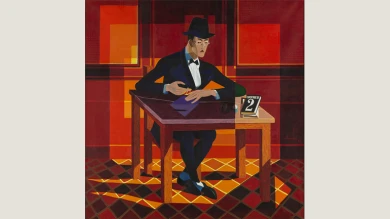
![Julio Bresane. O Batuque dos Astros [Algarabía de los astros]. Película, 2012](https://recursos.museoreinasofia.es/styles/small_landscape/public/Actividades/pessoa-gr.jpg.webp)
